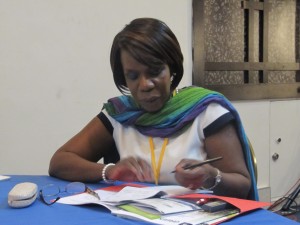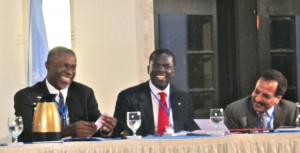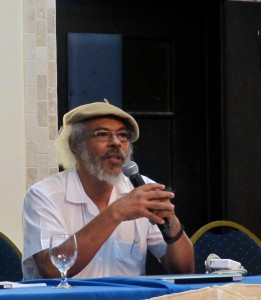
Making The Case, Over and Over: On The Pathway to a Green Economy
February 24th, 2015
It was Kermit the Frog who sang, in that lugubrious voice of his: “It’s not easy being green…”
For the Caribbean, it appears, it has not been easy so far to persuade regional governments and private sectors that greening our economies is the way to go. Speaking at the Caribbean Green Economy Conference 2015 in Kingston this morning, Ambassador Edwin Laurent, Senior Advisor on the Caribbean Green Economy Initiative, observed wryly: “It seems the case [for a green economy] has to be made over and over again.” Jamaica’s Ministry of Water, Land, Environment and Climate Change is hosting the Conference at the Jamaica Pegasus Hotel (February 23 – 25) in collaboration with the United Nations Environment Programme, with funding support from the European Union. The meeting is part of an ongoing project called “Advancing Caribbean States’ Sustainable Development Through Green Economy.” The aim is to share progress Caribbean SIDS have made in the transition to a green economy, and to look at the way forward. This transition is not without its challenges. Being green – or rather, getting to green – is not as easy as it looks.
What are SIDS? They are Small Island Developing States – which of course includes most of the Caribbean Community (CARICOM). Last September in “Social Impact,” I looked right across the globe from the twentieth anniversary meeting of the International Seabed Authority in Kingston – all the way to another SID, the Pacific island of Samoa, where the Third International UN Conference on SIDS had just opened. The Samoa Pathway, which came out of the UN confab attended by Jamaica’s Minister Robert Pickersgill among other Caribbean officials, is (and should be) a key guiding document as Caribbean countries set out to do what needs to be done.
Samoa’s outcome document is a comprehensive and detailed Pathway to action. As with all discussions on tackling the clear (and very present) danger of climate change, the mood of the Kingston conference is forward-looking. No time to cry over spilt milk. It is time to move on to address the vulnerabilities that every Caribbean country shares – economic, social and environmental, all inextricably linked. “The time is now,” as Minister Pickersgill says, to set things in motion. The time for hesitation is over.

Dr. Paulette Bynoe, Director of the University of Guyana’s School of Earth and Environmental Sciences, conducted a pilot study of an Amerindian community seeking to move towards a more sustainable way of life.
The Caribbean, the Kingston conference noted, must not only be decisive in taking steps to build a green economy. It must be creative, and importantly, it must establish partnerships. The Preamble to the Samoa Pathway states, clearly and simply, that sustainable development in SIDS “can be achieved only with a broad alliance of people, governments, civil society and the private sector all working together to achieve the future we want for present and future generations.” Proponents of the green economy must be able to demonstrate that this is the beneficial, profitable – and indeed the only course to take. In other words, it has to be a “no-brainer.” Green economists must show the Guyanese Amerindian man who is tempted to leave his family and his village for a job in a faraway gold mine that it is better to stay home and build a sustainable lifestyle. The manufacturer dependent on fossil fuels must be convinced that he needs to switch to renewables and conserve water to reduce costs and improve efficiency in the future.
And bringing in these players is absolutely essential. Knowledge, understanding and trust are essential components. So how are we getting on with the partnerships? To the average Jamaican or Trinidadian on the street, the term “green economy” means little or nothing. Engaging civil society – a very diverse group, as the Caribbean Natural Resources Institute’s (CANARI) Nicole Leotaud pointed out – is challenging, although CANARI has made an excellent start with its multi-stakeholder “Action Learning Groups.”
As for the business sector, there is some way to go to obtain buy-in. When listening to persuasive arguments to retool and invest in green technology, a businessman/woman is likely to turn round and say, “Yes, I get it; but is the government doing the same or are they still building coal-fired power plants?” This was a scenario painted by Keron Niles of UWI Consulting Ltd., a key research partner in the Caribbean Green Economy Initiative. Dr. Niles concluded (and repeated): “We need leadership!” Governments must “walk the talk,” and lead the way. Or as Professor Michael Witter of UWI Mona campus put it, the business community must, at this point “kick in.”
So the message is clear. Caribbean nations, arms linked in strong (or strengthening) partnership, must walk boldly along the Pathway they helped build in Samoa. Of course, they will craft their own home-grown solutions and strategies along the way; and that is as it should be. Neither is there a “cookie cutter” formula that fits every small island. But the Caribbean on the whole must – and this was stressed – control its own destiny. And don’t forget to bring young Caribbean citizens on board, I might add; after all, we are talking about the future here.
And let’s be clear about this, too. However difficult the journey, the will and the determination must be there, for there is no faltering, no turning back. Small steps have been taken, but the Caribbean needs to quicken its stride. Some of the Pathway will be uphill work. There may even be stairs to climb. But as Dr. Martin Luther King said, “You don’t have to see the whole staircase, just take the first step.”

(l-r) Hon. Clayton Burgin, Minister of Health, Wellness and Environment, St. Vincent and the Grenadines; Minister of Agriculture, Trade, Housing, Lands and Environment Hon. Claude Hogan, Government of Montserrat; and Dr. Arun Kashyap, United Nations Resident Coordinator and Resident Representative/United Nations Development Programme in Jamaica, sharing a joke at the Opening Session of the Caribbean Green Economy Conference 2015 on February 23 at the Jamaica Pegasus Hotel.
Tags: Ambassador Edwin Laurent, Amerindian, Arun Kashyap, CANARI, Caribbean, Caribbean Green Economy Initiative, Caribbean Natural Resources Institute, CARICOM, civil society, Claude Hogan, Clayton Burgin, European Union, green economy, Guyana, International Seabed Authority, Jamaica, Keron Niles, Kingston, Michael Witter, Ministry of Water Land Environment Climate Change, Montserrat, Nicole Leotaud, renewable energy, Robert Pickersgill, Samoa, Samoa Pathway, Small Island Developing States, St. Vincent and the Grenadines, sustainable development, United Nations Development Programme, United Nations Environment Programme, University of the West Indies, UWI Consulting, water resource management
The Gleaner reserves the right not to publish comments that may be deemed libelous, derogatory or indecent.
To respond to The Gleaner please use the feedback form.
7 Responses to “Making The Case, Over and Over: On The Pathway to a Green Economy”
- We Are the Zoomers
- Living Online with Humans and Birds: NAOC 2020
- Human Trafficking and the Problem of Public Education
- Down Memory Lane
- Are We Ready to Recover from COVID-19?
- Road Safety Matters: Is Your Vehicle Safe?
- Sexual Harassment, Me Too, and the Minister’s Disturbing Giggle
- The Vulnerable Senior Citizens, Private Care Homes and COVID-19
- A Muddle Over Masks
- Here is Something Life-Saving You Can Do: Give Blood!





Come on Emma. We need very high standards when we are involved in building an economy. We also need complete accuracy and transparency in reoorting. Green economies are extremely expensive. Poor people are at extreme disadvantage under green economies. These claims can easily be proven but as humans often being influenced by confirmation bias we often never see plainly facts that challenge our position. For instance solar energy is far more expensive that fossil fuel energy. And it is a fact that solar energy is not clean or green energy as many persons claim. This is easy to discover. Just google the byproducts of solar production and solar waste problems. California had a very serious problem with solar waste a few years ago. Did y ou read about this or did confirmation bias blind you to the story?
*EXPOSING SOME FALSEHOODS OF SO-CALLED GREEN ECONOMIES*
*Carlos Hill and Bernie Madoff proved to me that humans are extremely easy
to deceive. Just introduce some sort of financial benefit or convince them
they are some sort of victim and the rest is easy. They then become
completely blinded to facts and proven theories. It is a fact that lead
and cadmium are byproducts of the solar industry. Lead is a deadly toxin
to human health. I do not have to give the details here. But any seeker
of truth who wants to build an economy on the lie that Solar is clean will
have to contend with the problem California faces with vast quantities of
hazardous waste materials that it may ship to third world countries like
Jamaica. Ever wonder why China is the most toxic place on earth? But you
just wait until those millions of solar panels have to be replaced. The
belief of a falsehood of clean solar will slap you where it hurts most.*
Thank you for the lecture on solar panels, John Anthony. I admit, I have not heard about California’s solar waste. But in fact, the conference was not/not about renewable energy at all. It was about building a more sustainable society and building businesses and lifestyles that are environmentally friendly – and there was quite a lot of emphasis on the benefits this would bring to “poor people,” who are already at a huge disadvantage in Caribbean economies by the way. I would suggest that our current lifestyle in Jamaica – heavily dependent on fossil fuels, with an oil import bill of around US$2 billion – is “extremely expensive.” So what is your solution to the issue? I don’t see you mentioning any? Thank you again for your comments!
You have not seen my solutions? Of course you have. I have sent you the emails. Some of the ideas there you respond with “great suggestion.” Or perhaps it must be another Emma Lewis. In case it is here are practical solutions to Jamaica’s import expense of petroleum.
1. First, because of our Anancy culture we often tend to disparage persons and products that does good to and for us. Petroleum has been extremely beneficial to Jamaica. It runs the economy. What if there was no petroleum? We would be still in the stone age. So rather than see our petroleum expense as something expensive and bad for us, we should see it as buying a product that we need and which is vital to our existence. We need to correct our thinking at the base or else all our actions are based on false premises. Sure the petroleum is expensive but so is land in Jamaica; so is housing in Jamaica. We buy things we need; period whether they are expensive or not.
2. We put forward the idea ten years ago when petroleum was far cheaper that JPS could hedge against rising petroleum prices by investing directly in the commodity. This would have been very easy to do. All that was needed was an account that could be used to purchase shares in petroleum companies or interests in mining operations. So when petroleum rises JPS would benefit. Then in addition, the government could set up a petroleum fund company that could trade on the stock exchange. Locals could buy shares in this fund and the fund could also invest in the petroleum sectdor to hedge against rising prices.
2. The Petro Caribe Fund can also be used in similar fashion. The fund could invest in the petroleum sector in Trinidad to hedge atainst rising prices.
3.Electricity can also be produced from coal. The many lies that have been told on coal are easily exposed for what they are….blatant attempt at mind destabilization by freaks who have fossils.
By P Gosselin on 18. December 2012
The International Energy Agency (IEA) has issued a press release on global coal consumption. Many claim that last decade’s rapidly rising coal consumption is causing global warming. I beg your pardon:
While coal consumption has “risen rapidly” over the last decade, the linear global temperature trend has dropped at a rate of 0.7°C/century! Source: woodfortrees.org.
The IEA press release (emphasis added):
Coal’s share of the global energy mix continues to rise, and by 2017 coal will come close to surpassing oil as the world’s top energy source, the International Energy Agency (IEA) said today as it released its annual Medium-Term Coal Market Report (MCMR).
The IEA expects that coal demand will increase in every region of the world except in the United States, where coal is being pushed out by natural gas.
“Thanks to abundant supplies and insatiable demand for power from emerging markets, coal met nearly half of the rise in global energy demand during the first decade of the 21st Century,” said IEA Executive Director Maria van der Hoeven. “This report sees that trend continuing.
In fact, the world will burn around 1.2 billion more tonnes of coal per year by 2017 compared to today – equivalent to the current coal consumption of Russia and the United States combined. Coal’s share of the global energy mix continues to grow each year, and if no changes are made to current policies, coal will catch oil within a decade.”
China and India lead the growth in coal consumption over the next five years. The report says China will surpass the rest of the world in coal demand during the outlook period, while India will become the largest seaborne coal importer and second-largest consumer, surpassing the United States.
The report notes that in the absence of a high carbon price, only fierce competition from low-priced gas can effectively reduce coal demand. “The US experience suggests that a more efficient gas market, marked by flexible pricing and fueled by indigenous unconventional resources that are produced sustainably, can reduce coal use, CO2 emissions and consumers’ electricity bills, without harming energy security,” said Ms. van der Hoeven. “Europe, China and other regions should take note.”
She noted that the report’s forecasts are based on a troubling assumption, namely, that carbon capture and sequestration (CCS) will not be available during the outlook period. “CCS technologies are not taking off as once expected, which means CO2 emissions will keep growing substantially. Without progress in CCS, and if other countries cannot replicate the US experience and reduce coal demand, coal faces the risk of a potential climate policy backlash,” she said.
As US coal demand declines, more US coal is going to Europe, where low CO2 prices and high gas prices are increasing the competitiveness of coal in the power generation system. This trend, however, is close to peaking, and coal demand by 2017 in Europe is projected to drop to levels slightly above those in 2011, due to increasing renewable generation and decommissioning of old coal plants.
Amid concern about the impact of Chinese uncertainty on coal markets, the report offers a Chinese Slowdown Case. This scenario shows that even if Chinese GDP growth were to slow to a 4.6% average over the period, coal demand would still increase both globally and in China – indicating that coal demand is not likely to stop growing even with more bearish economic perspectives.
Who knows, maybe burning coal is actually causing global cooling.
– See more at: http://notrickszone.com/2012/12/18/good-news-consumption-of-affordable-coal-continues-to-eradicate-poverty-worldwide-with-no-impact-on-climate/#sthash.9lPLuC9r.dpuf
Wait a minute there Emma. I went back and took a closer look at your article. Are you aware that the whole premise of global warming, which has deceptively been re-named climate change is based on a unproven theory and supported by lies and fraudulent practices? Are you a Christian? If so I have a major problem understanding how a Christian could support a theory that is supported by so many blatant falsehoods and lies. I stopped counting at 129. Yes there are that many frauds / lies / deceitful programs associated with global warming beginning with the propaganda piece produced by Al Gore, which was exposed in a British Court as being riddled with inacurrate statements. Of course you never heard of this either because the media support the fraudulent theory and will do nothing to sabotage their belief.
YOU WROTE;
“Samoa’s outcome document is a comprehensive and detailed Pathway to action. As with all discussions on tackling the clear (and very present) danger of climate change, the mood of the Kingston conference is forward-looking”
What present danger? All weather storms have shown dramatic decrease in incidence and severity over the past century. Again, if you depend on the evening news for your information you will not know this. Who says the small island could sink and the rising ocean will drown them? Well you may never have read of islands appearing out of nowhere,. Yes pieces of lands have just erupted right in the middle of oceans. Why don’t you go and google that and do some real research instead of being spoon fed inaccuries??
The earth will never drown again. God promised that to us. God also said that there will always be summer and winter and cold and heat. He promised that to us. So global warming will always be a failure.
Now when someone is paid or given incentives it disturbs and affects their vision and perception. So the global warming funds make you all want to believe that the theory is true. It is not.
We are still awaiting a proper response from Emma. We will not stand by and see misinformation and de-information campaigns waged against the minds of Jamaicans who do not have the time or courage to do research. Truth shall triumph. Falsehoods and deceits will fail
You are clearly a climate change denier, John Anthony! I suggest you take your arguments further with some of the scientists who attended and spoke at the conference. I would rather not get involved in defending myself for believing that climate change is real. No, I am not a Christian. Are you? “Global warming will always be a failure”? OK. That is your belief. I have my own! Thank you very much for your comments and I hope our readers will find them interesting. (Yes, I am aware of the case brought by a school governor who did not want Al Gore’s film shown at his school. The British judge did not actually find any scientific errors in the case, although he thought the teaching notes were a bit over-exaggerated and these were moderated). Thank you for your comments.